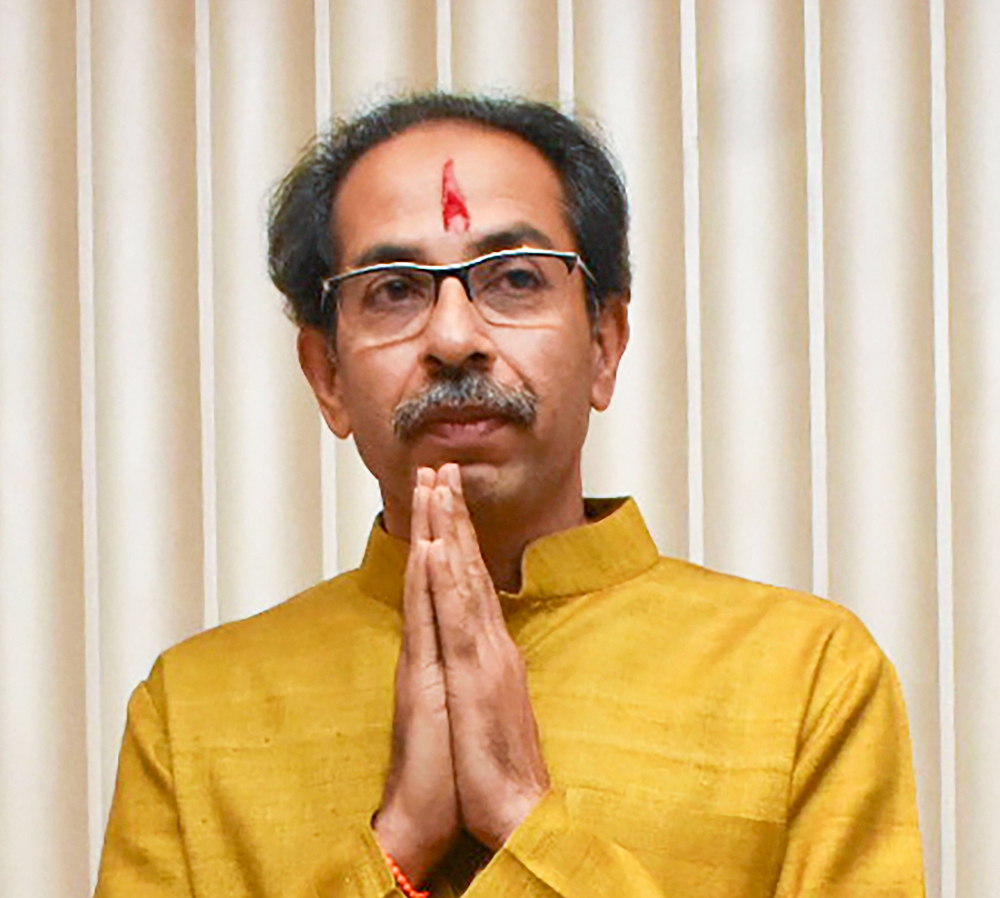Constitution Day appeared to bring the curtains down on the darkest chapter in recent memory in India with the collapse of the BJP’s graveyard-shift operation to install its government in Maharashtra.
With the Supreme Court setting a 5pm deadline on Wednesday for a trust vote on the floor of the House, BJP leader Devendra Fadnavis was left with little option but to pull the plug on his three-day-old government.
By the time Fadnavis sought to cast himself as a martyr and clambered to the moral high ground, his newfound deputy chief minister Ajit Pawar had deserted him.
The tri-party alliance of the Shiv Sena, NCP and the Congress replaced lethargy with swiftness and elected Uddhav Thackeray as the leader on Tuesday evening. Uddhav later went to the Raj Bhavan to stake claim.
Governor Bhagat Singh Koshyari has invited Uddhav to take oath at 6.40pm on Thursday in Shivaji Park. He has given Uddhav time till December 3 to prove his majority.
Uddhav said his government would not seek “revenge” against anyone, adding: “I will go to Delhi to meet my ‘elder brother’ after the government is formed.” Prime Minister Narendra Modi had called Uddhav “my younger brother” during campaign rallies.
The Maha Vikas Aghadi (MVA), as the tri-party alliance is formally called, took the decisions at a Mumbai hotel, a venue that underscored the importance of such establishments in Indian politics when edifice after edifice either stumbled or took time to make up their mind.
The Supreme Court did take a firm stand that it would not allow horse-trading and ordered the trust vote by Wednesday 5pm, which has become redundant after the resignation of Fadnavis.
“In a situation wherein, if the floor test is delayed, there is a possibility of horse trading, it becomes incumbent upon the court to act to protect democratic values. An immediate floor test, in such a case, might be the most effective mechanism to do so,” said the bench of Justices N.V. Ramana, Ashok Bhushan and Sanjiv Khanna.
But by the time the unequivocal pronouncement was delivered, almost 48 hours had passed since the bench first took up the matter. Two days are a long time in Indian politics, especially when an executive leadership that does not hesitate in getting a presidential proclamation notified at 5.47am to meet its political objectives is in the saddle.
Addressing the MLAs gathered in the hotel, Uddhav thanked Congress interim president Sonia Gandhi — who took the biggest ideological gamble although Sharad Pawar played the most important role in turning the tide — and acknowledged that a dramatic realignment had taken place.
“I want to thank Soniaji also. Parties with different ideologies have come together... those who were friends for 30 years, did not trust us. But those against whom we fought for 30 years have trusted me,” Uddhav said.
He said Maharashtra would give a new direction to the politics of the country in a repeat of what he said earlier this month while parting ways with long-standing ally, the BJP.
Briefing the media after the meeting, NCP’s Nawab Malik said the meeting began with a condolence reference in memory of those killed in the Mumbai terror attack 11 years ago. They also welcomed the Supreme Court verdict.
The three parties now seem to be driven by not just a new resolve to swim together but also the realisation that they cannot leave anything to chance.
Soon after Fadnavis announced his resignation, Congress leader Prithviraj Chavan said in the national capital: “We demand that Uddhav Thackeray be invited to form the government in Maharashtra immediately.”
This was a far cry from his stance on Friday evening when despite Sharad Pawar announcing that Thackeray was the MVA’s chief minister-designate, Chavan did not say so in as many words.
Given the similarities of the Maharashtra version of “Operation Lotus” (a euphemism for poaching legislators) with what happened in Karnataka last year when a relentless BJP clawed back after losing power initially, those seeking a reprieve from the ruling party juggernaut are now hoping that the parallels end here.
For, this new experiment in Indian politics is not only burdened by the weight of its own contradictions but there are the additional pitfalls of a hostile Centre steered by a duo who have been forced to eat humble pie for now.











